IGF 2026 Games I Want to Talk About
For the last few years, I've been a judge in the annual Independent Games Festival. With judging wrapping up for the year, I wanted to write about some of the games I found interesting this year. In previous years I posted my lists on a social media site that's no longer available, so this year I thought I'd bring it here to you, my loyal readers.
This isn't a list of games I expect to win or that I think are shortlisted for any awards; I'm one of hundreds of judges, and this is just one person's opinion. (Besides, as you're aware if you read this blog, something being interesting to me it's pretty far from a guarantee that it has wide appeal!) This is just a list of games I found interesting and thought my readers might as well. I've tried to highlight several games I think would be especially interesting to CD-ROM Journal readers, but you'll have to excuse my dalliances with "normal gaming". I've also tried to balance the list between game you can play right now and unreleased games.
Perfect Tides: Station to Station
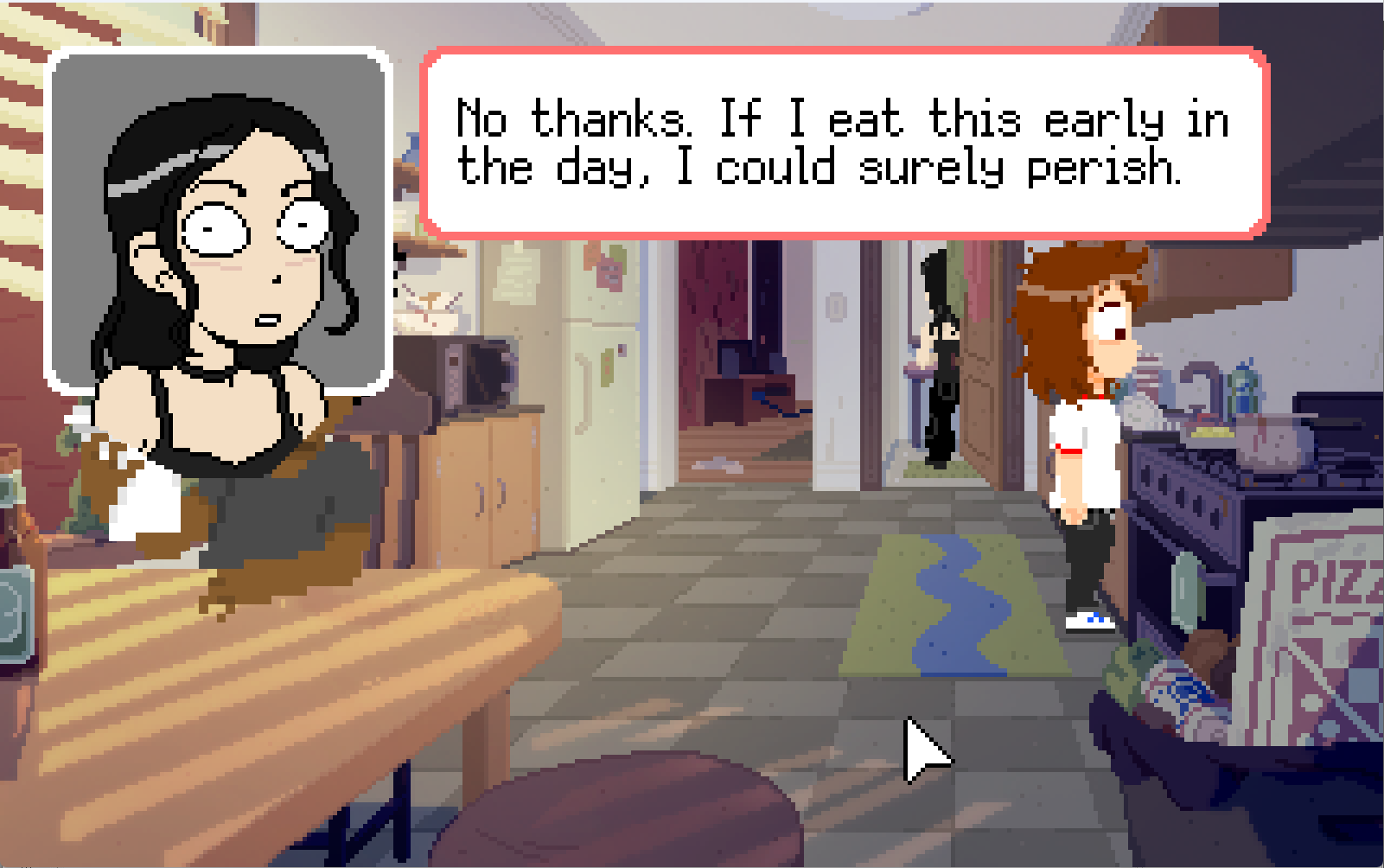
Perfect Tides: Station to Station is the second game from the indie game studio of Meredith Gran, who's best known for her webcomic Octopus Pie. A graphic adventure following the first year of university for small-town kid Mara, it's a lushly-written game—one of those games where you want to click absolutely every surface just to see what description or dialogue it has.
This is mechanically brilliant in ways I didn't expect, even having played the original Perfect Tides. Mara's a writing student, so she needs to write assignments over the course of the game—which you, the player, get to write for her by telling her what topics to pick. These are the same topics you get to talk to all of the game's characters about, and the more you talk about things, the better she becomes at them. This leads to some hilarious moments on its own (at a party Mara has a conversation about music that goes so badly she cries, then gains a level in the concept of "music"), but it also gives the player a surprising amount of freedom in deciding how they're going to approach the world or even what they're going to write about. The game will let you completely ignore the assigned topic and write about anarchism for school if you really want to. It's delightful.
kevin's PLAYING in berlin

This is the latest from experimental art game developer Kevin Du (IGF 2024 Nuovo finalist Kevin(1997-2007) and 2025 finalist Ginger). This year's kevin's PLAYING in berlin is a triptych of loosely-connected games that continue their experimentation with storytelling through constructed languages. I was most struck by You Have Received XX Messages in a Language Unknown Even to Its Speaker, an "emotional ASMR game", in which players explore a field of ASMR messages in a constructed language. It's a smart reflection on how the immediate impact of most ASMR is more about the tone than the actual words being spoken and makes a great medium for Du's experiments. Ke Vin, the most visual of the three, features a vertically-bisected playfield where each half of the screen is filled with half of a video of Du exploring different parts of a city. What if Ginger is a Religion is a play on last year's Ginger, which was focused on story via decoding and reproducing sound; this time the constructed language is encoded via marginalia in a dictionary that players can turn on and off at will.
Du's games tend to be uncompromising in their design, trusting the player to approach the game on their own terms or not at all, and that pureness is what makes them so fascinating.
Stray Children
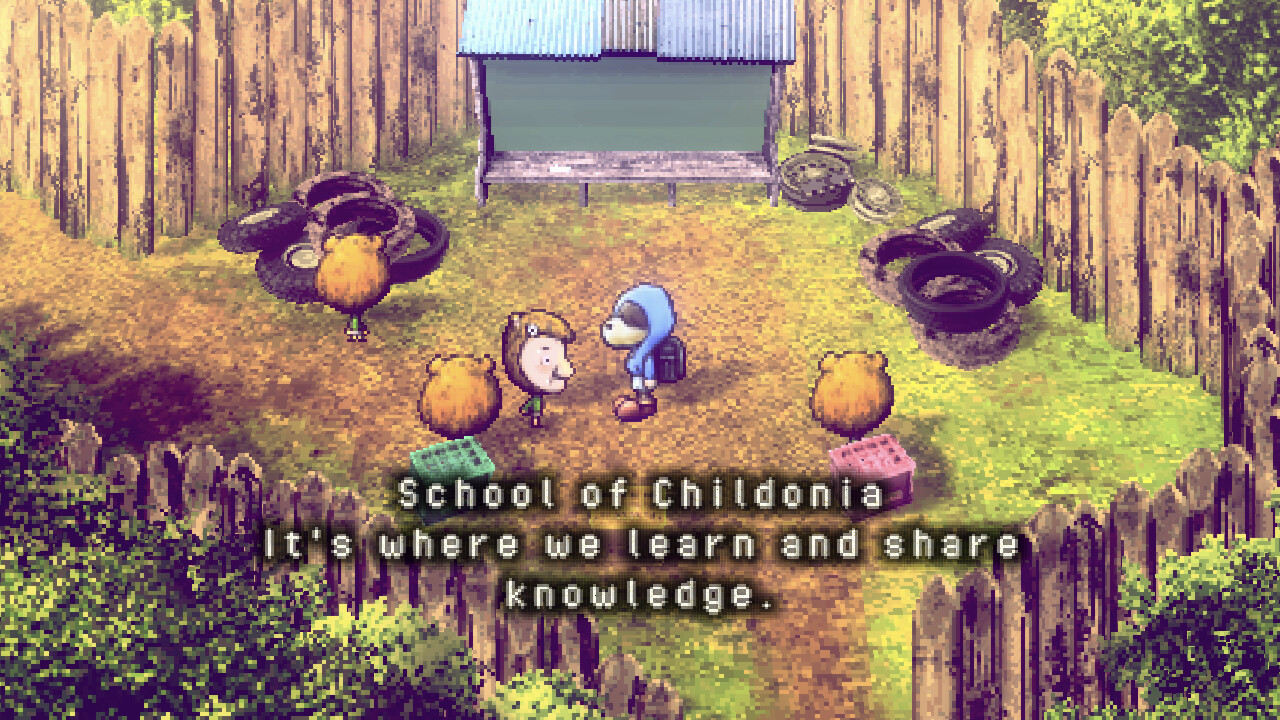
Stray Children is the latest game from Yoshiro Kimura's studio Onion Games and the spiritual successor to his 1997 RPG without combat Moon. It's a beautiful game that leans fully into the tonal oddities of JRPGs—weaving effortlessly between goofy, chopped-feeling lines and disarmingly genuine emotional moments. It's smart writing that makes good use of the "forced to grow up too soon" feeling from its child protagonist who finds themselves surrounded by adults who don't seem to be able to manage their own problems.
Moon was one of the inspirations for Undertale, and now Stray Children feels like a response to Undertale in turn—playing it feels like experiencing the history of post-RPGs in a single game.
Blippo+

One of the year's biggest surprises. Blippo+ is a game in the form of channel surfing—a TV network from another planet, filled with original programs to watch and swap between. The programs are their own reward, but it has an overarching story that develops over the course of its real-time twelve-week broadcast schedule. It's shockingly well-produced experimental cinema, clearly the result of a team of directors and actors being given free reign to have fun doing whatever they wanted making otherworldly TV.
(Expect to see more about Blippo+ on CD-ROM Journal.)
Jail Dice: Roll to Break
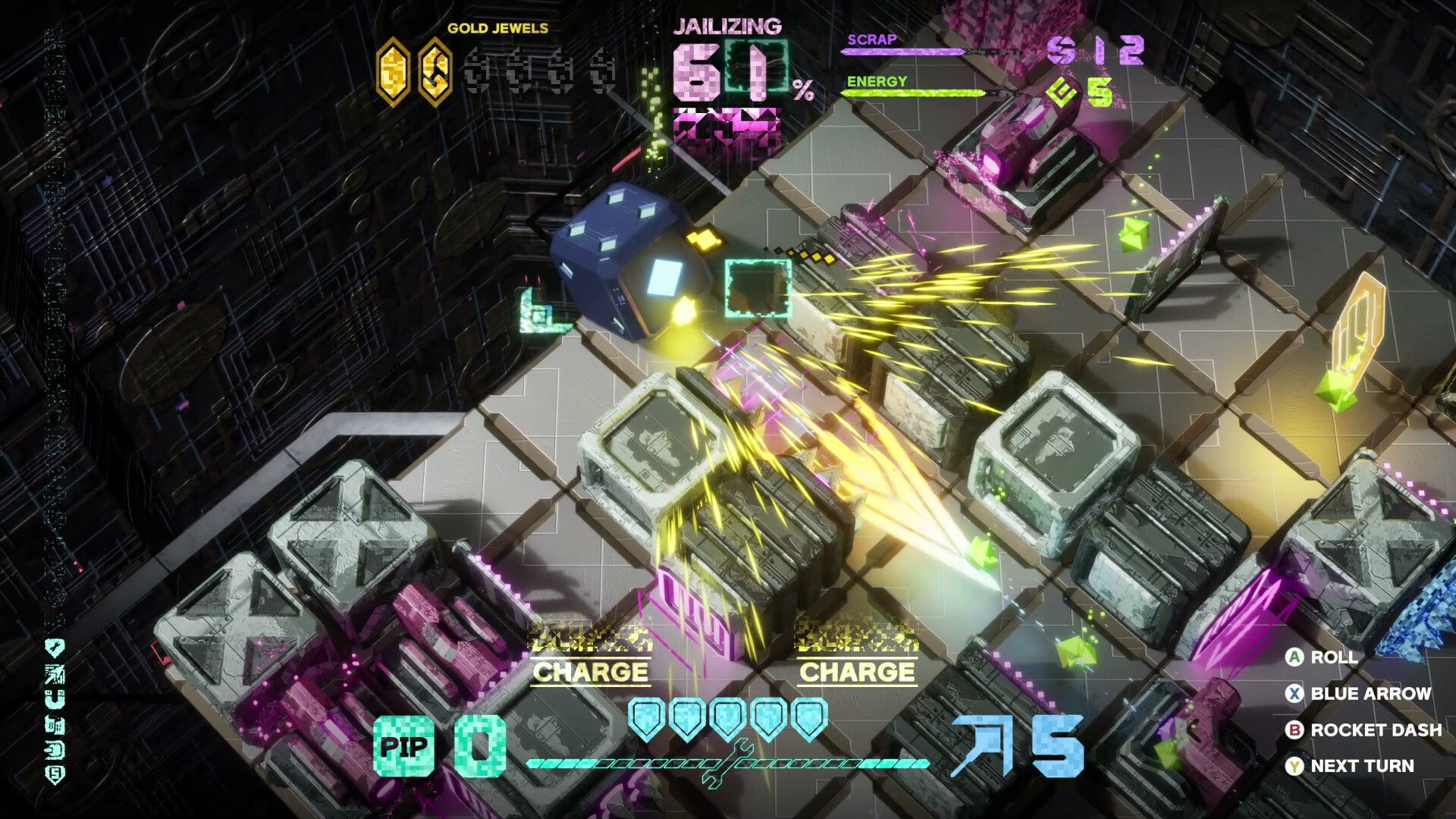
Jail Dice is exactly the kind of game I hope to discover via IGF. It's a genuinely wild collection of mechanics that feels like something from the experimental days of the PS1. Players control a space ship dice rolling across a game field, knocking down walls and collecting gems in order to be able to escape to the next stage. It's simultaneously turn-based (new obstacles and enemies only spawn every time you roll a single tile) and real-time (enemies and obstacles fire in real-time), and also requires players to be paying attention to the positioning of their die's pips as they move around to use their abilities. It had a single review on Steam at the time it was submitted to IGF and could easily have been overlooked without an event like IGF to bring it to more eyes. I'm grateful to have been able to try it.
Mr. Elevator
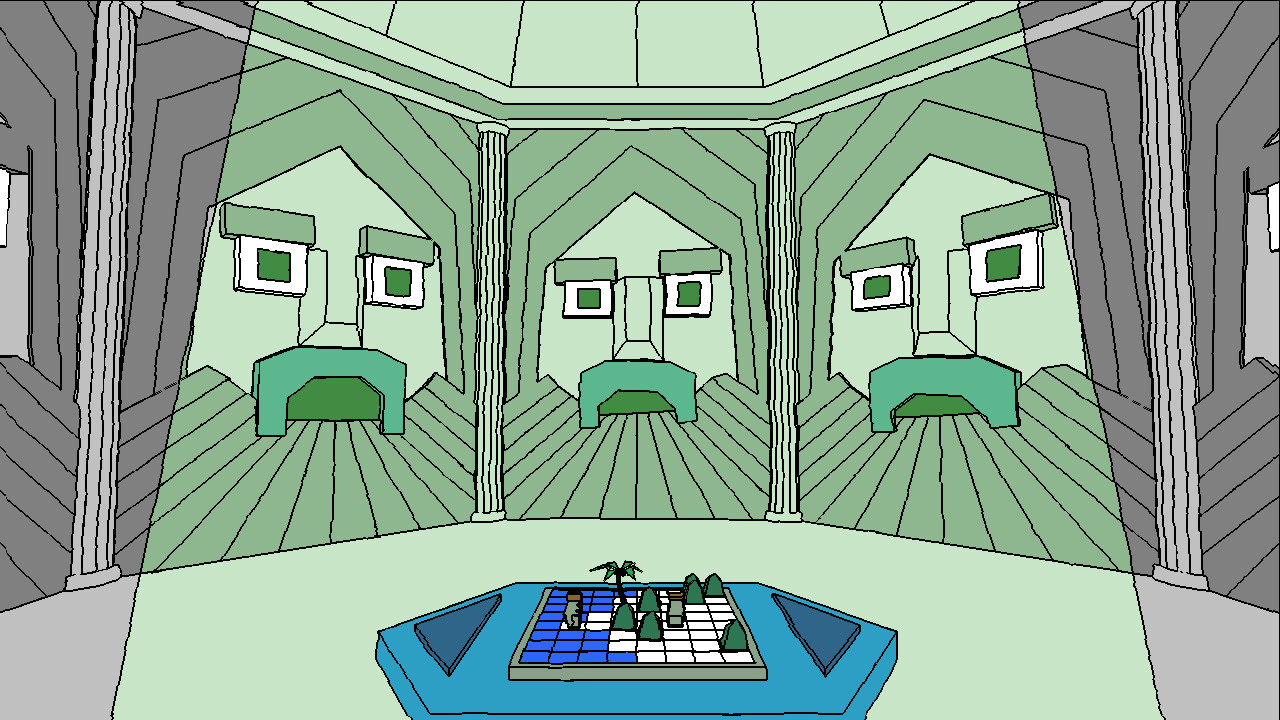
Mr. Elevator is part of the current school of real-time 3D adventure game a la Blue Prince. It takes its puzzle cues from oldschool escape room puzzle games like Crimson Room, but the real standout is its absurdist control scheme where players control both of their characters' arms individually using the mouse (or two analogue sticks). The awkwardness of trying to juggle all your items at once with only two hands and no inventory menu, and the over-the-top silliness of the animations, gives the Myst-esque puzzling a physicality that really enhances the whole experience. The artwork is also excellent; I've never seen a game that's managed to recreate ca. 1993 Directorcore this effectively in realtime 3D. More than just a skin-deep shader, the 3D objects are carefully sculpted so that they manage to look like lo-fi 2D hand-drawn objects at any given angle.
Demonschool
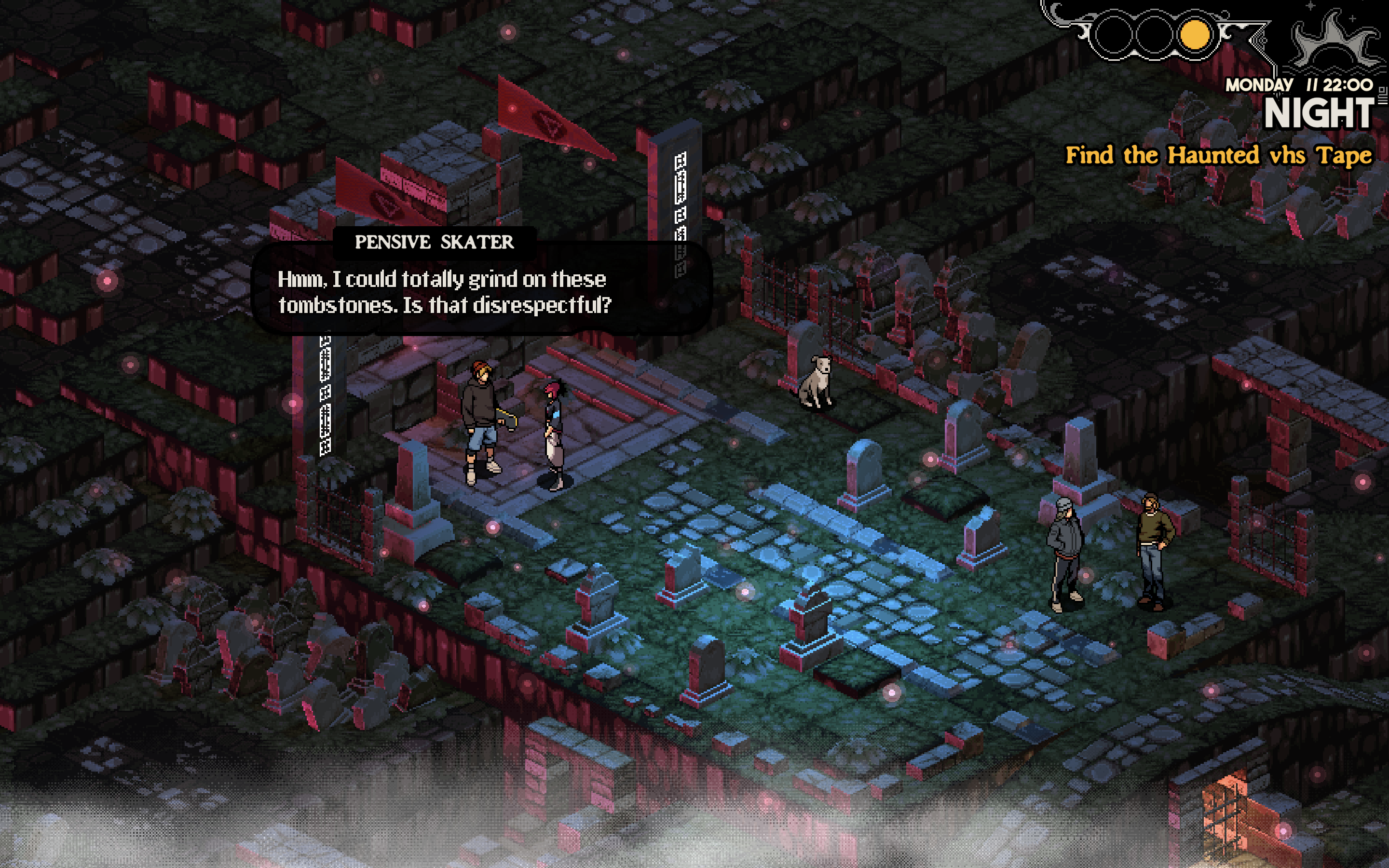
Necrosoft's Demonschool is a contemporary horror tactical RPG. It's a packed genre, but I was impressed the combat system was this effective at staking out something that feels distinct and that also works this well strategically. Its chess-inspired structure is based on board positioning and character movement. It gives you a set of characters with extremely specific movement skills, but whose skills also have the ability to shift enemies around on the board; since you also have the ability to plot a full round's worth of turns before the enemy gets to move, it allows some very interesting strategic depth in deciding when and where someone will move to let you set up another character for a much more powerful attack. It feels like an attempt to recreate the absolute chaos of Vandal Hearts II or Hoshigami in a way that feels containable.
A Persona-inspired RPG lives or dies on its vibes and, thankfully, Demonschool has the vibes. Its isometric environments do a fantastic job of carrying the game's mood, and I was especially taken with its analogue synth-heavy soundtrack.
Angeline Era
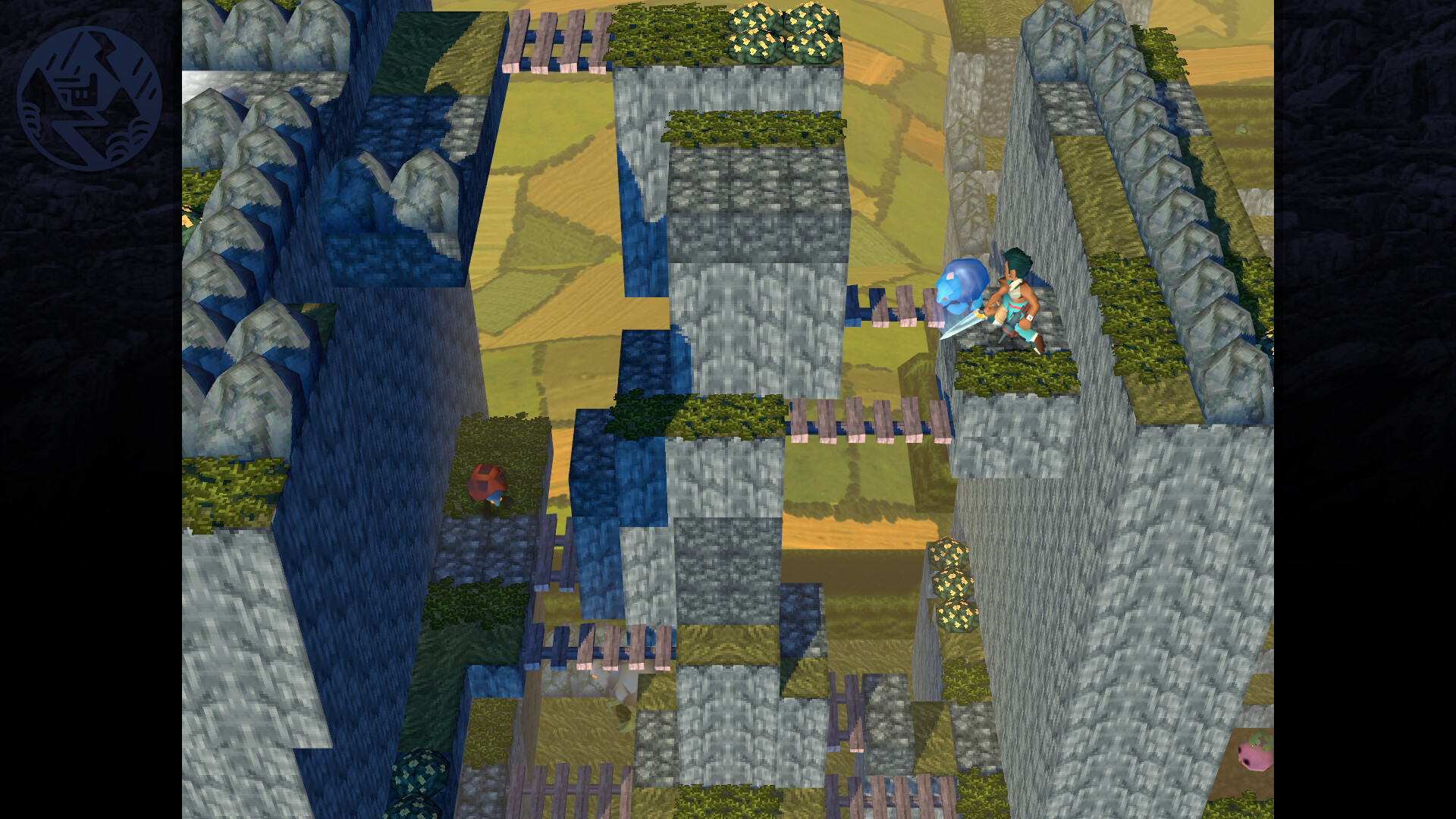
Angeline Era is the latest game from the duo behind Anodyne and Sephonie. A throwback to Ys-style bump combat, this is the kind of "secrets game" I really don't feel like I see much anymore. I can't remember the last time an action game just trusted me to explore it and engage with its specific design vocabulary, and I'm excited to see more from the finished game.
▒▓▜▟▝▐
In a highly unusual situation, I'm not able to talk about this game in any meaningful way. This game is completely unannounced, so all that I'm able to say is that it's by AP Thomson (Beglitched, Fortune-499, and co-developer of IGF 2025 grand prize winner Consume Me)... and that I'm not the only one who played it in IGF who wants to be talking about it. So that's my recommendation: keep an eye out for Unannounced Video Game Project by AP Thomson.